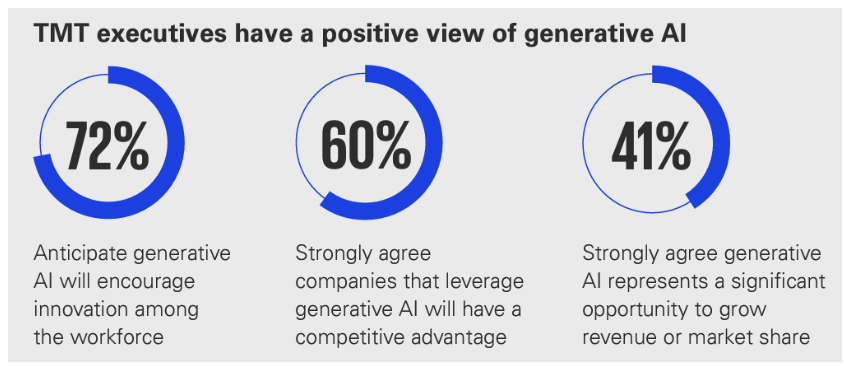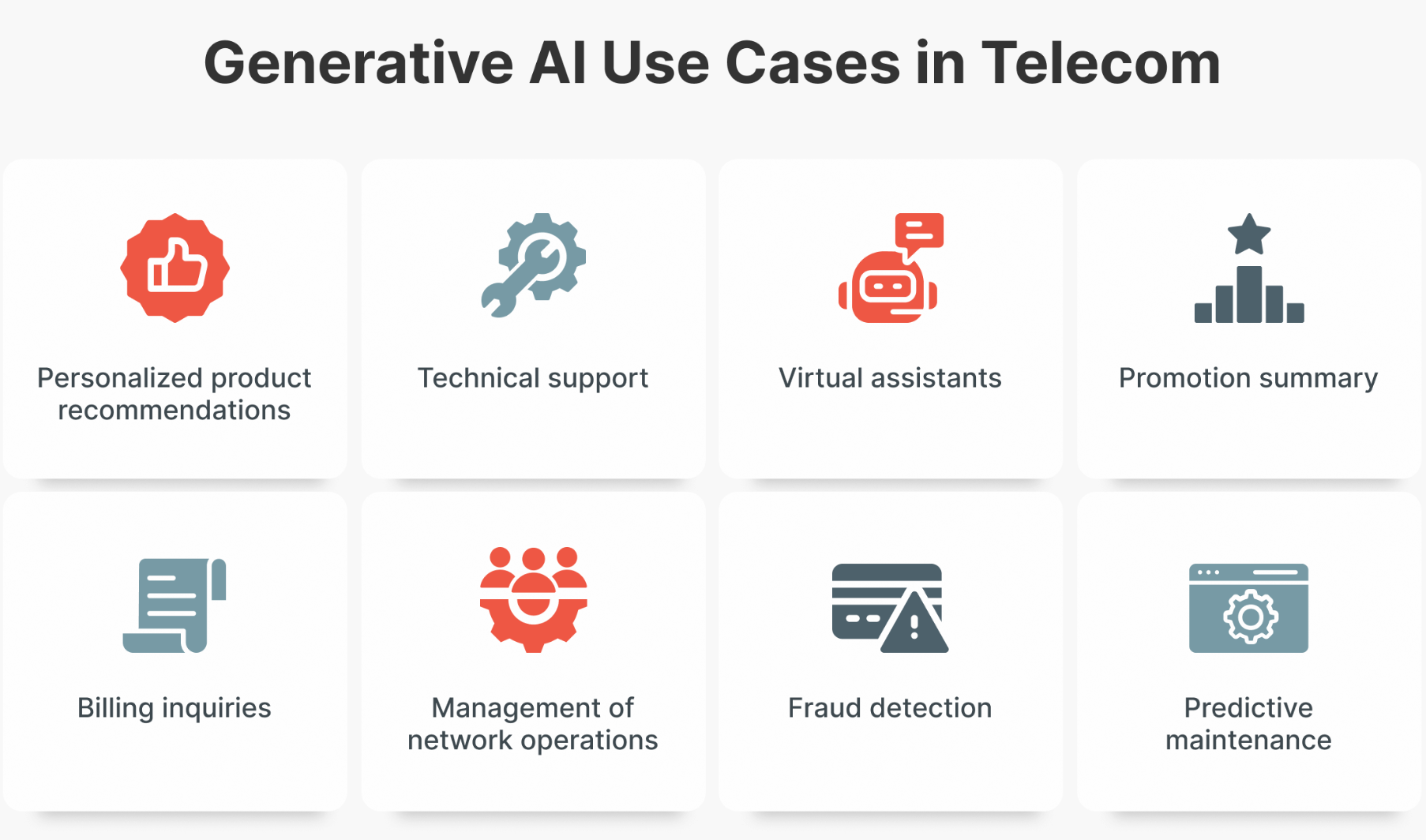
Leveraging Generative AI for Enhanced Customer Engagement in Telecom
Key takeaways:
- How generative AI enhances customer engagement and service delivery.
- The role of AI in optimizing network planning and ensuring data privacy.
- Future trends and strategic recommendations for integrating AI in telecom.
Generative AI is driving significant changes in the telecommunications industry. By leveraging advanced models like OpenAI’s GPT, telecom companies are enhancing customer engagement, optimizing network operations, and ensuring robust data privacy.
This technology offers a range of practical applications, from personalized customer service to advanced network planning, making it an essential tool for modern telecom enterprises.
Explore how generative AI is transforming telecom operations and setting new standards for efficiency and innovation.
The Transformative Impact of AI in Telecom
Generative AI is reshaping the telecommunications industry by offering solutions that:
- Enhance customer engagement
- Optimize network operations
- Ensure robust data privacy
By leveraging advanced AI models, telecom companies can revolutionize their services. These enhancements make telecom services more efficient, personalized, and secure.

Key Applications of Generative AI in Telecommunications
Key applications of generative AI in telecommunications include efficient network planning, improved data security, innovative marketing strategies, and enhanced operational efficiency.
Here’s a breakdown of the key applications of generative AI in the telecom industry:
1. Efficient Network Planning and Optimization with Generative AI
Generative AI enhances network planning and optimization by simulating network traffic, predicting usage patterns, and optimizing infrastructure. These capabilities improve service quality and operational efficiency, enabling telecom companies to better meet customer demands.
- AI-Driven Network Traffic Simulation: Telecom companies use generative AI to:
- Simulate network traffic
- Predict usage patterns
- Identify bottlenecks
- Make informed decisions on network expansions.
- AI-Driven Network Traffic Simulation: Telecom companies use generative AI to:
- Predictive Analytics for Infrastructure Planning: AI-powered predictive analytics helps telecom providers forecast future network demands by analyzing historical data and usage trends. This approach optimizes current infrastructure and aids in strategic planning for future growth.
2. Data Privacy and Security through Generative AI
Data privacy and security are critical in telecommunications due to the vast amount of data generated. Here are the three major ways that generative AI enhances data privacy and security:
- Generating Synthetic Data: Generative AI creates synthetic data that mimics real-world data without exposing actual user information, allowing companies to test new algorithms without risking customer privacy.
- Enhancing Security Measures: AI models analyze vast data to detect unusual patterns that indicate security breaches or cyber-attacks.
- Network Security Simulations: Generative AI-powered simulations allow telecom companies to test security protocols in controlled environments. These protocols help companies to identify any vulnerabilities before exploitation.
3. Innovative Marketing and Content Generation with Generative AI
Generative AI transforms telecom marketing by creating personalized, dynamic content. This content helps companies engage their audience effectively and tailor strategies to individual customer needs. Here’s how:
- Personalizing Marketing Strategies with AI-Generated Content: AI analyzes data to generate personalized content that resonates with customers.
- Dynamic Advertisements and Customer Interaction Tools: AI-generated content includes dynamic ads that adapt in real-time to user interactions.
- Content Generation for Customer Interaction: Generative AI creates content for chatbots and virtual assistants, providing personalized responses and enhancing customer experience.
4. Operational Efficiency and Cost Reduction with Generative AI
Generative AI enhances operational efficiency in telecommunications by automating tasks and optimizing resource allocation. This leads to significant cost reduction by helping companies:
- Automating Routine Tasks: AI systems manage routine tasks like customer queries and network monitoring.
- Predictive Maintenance: AI predicts equipment failures and network disruptions, allowing telecom companies to address issues before they escalate.
- Enhancing Human Labor Efficiency: By automating repetitive tasks, generative AI allows employees to focus on strategic functions, improving job satisfaction and overall productivity.
Generative AI’s ability to automate tasks, predict maintenance needs, and optimize resources provides telecom companies with tools to enhance efficiency and reduce costs. This overall, allows for further innovation and growth within telecom companies.

Challenges and Considerations When Implementing AI in Telecom
Implementing generative AI in telecommunications offers many benefits, but it also presents significant challenges and considerations that must be addressed for successful deployment. Here’s a breakdown of the most prominent challenges seen by telecom operators when implementing Generative AI:
Privacy Concerns
Telecom companies must prioritize data privacy and security when integrating generative AI.
- Data Privacy: Ensuring data privacy is crucial as telecom companies handle vast amounts of sensitive customer data. AI integration must comply with regulations like GDPR and CCPA.
- Data Security: AI models need extensive datasets, raising concerns about data security and privacy breaches. Companies must use robust data anonymization techniques and synthetic data to mitigate these risks.
Data Requirements
High-quality data is essential for generative AI models, posing challenges in acquisition and management.
- High-Quality Data: Generative AI models require substantial amounts of high-quality, labeled data, posing a challenge, especially for smaller operators with limited resources.
- Data Management: Collecting, cleaning, and labeling data is resource-intensive. Investing in comprehensive data management strategies is essential to ensure AI models are effective.
Hardware and Expertise
Significant computational power and specialized technical skills are necessary for effective AI implementation.
- Specialized Hardware: Implementing generative AI demands significant computational power and requires advanced GPUs and cloud computing resources, which can be costly.
- Technical Expertise: Skilled professionals are needed to manage and fine-tune AI systems. The scarcity of such expertise in the job market is a major challenge.
Ethical Considerations
Addressing ethical issues such as bias and transparency is critical for responsible AI deployment.
- Bias and Fairness: AI models can inadvertently propagate biases from training data, leading to unfair outcomes. Telecom companies must implement stringent ethical guidelines and continuous monitoring to ensure fairness.
- Transparency and Audits: Regular audits, transparent decision-making processes, and the inclusion of diverse datasets are necessary to mitigate biases and ensure ethical AI deployment.
Addressing these challenges is crucial for telecom companies to harness the full potential of generative AI. By managing these challenges and concerns companies can successfully integrate AI and drive innovation.
Exploring the Future Prospects of AI in Telecom
The future of generative AI in the telecommunications industry is bright, with ongoing advancements promising even greater transformations. Telecom companies that strategically implement AI will be well-positioned to stay ahead of the competition and capitalize on emerging opportunities.

Key Trends and Predictions for AI in Telecom
Generative AI is expected to become increasingly integrated into various facets of telecommunications. One of the significant trends is the use of AI for real-time data analysis and decision-making. AI-driven analytics will enable telecom companies to respond quickly to changing market conditions and customer needs. This integration will help companies to provide a more agile and responsive service.
Another emerging trend is the development of AI-enhanced network management systems. These systems will use predictive analytics to optimize network performance continuously, ensuring high service quality and reliability. As AI technology advances, we can also expect more sophisticated virtual assistants and chatbots that offer even more personalized and intuitive customer interactions.
Top Strategic AI Recommendations for Telecom Leaders
To fully leverage the potential of generative AI, telecom leaders should consider the following strategic recommendations:
1. Invest in AI Research and Development:
Continuously invest in AI research and development to stay at the forefront of technological advancements. This includes building in-house AI expertise and collaborating with AI technology providers.
2. Enhance Data Management Practices:
Develop robust data management practices to ensure high-quality data for AI training. This includes data collection, cleaning, labeling, and maintaining comprehensive datasets that reflect diverse user demographics and behaviors.
3. Focus on Ethical AI Implementation:
Implement ethical guidelines and frameworks to ensure AI systems operate fairly and without bias. Regularly audit AI systems, maintain transparency in AI decision-making processes, and include diverse data sets to mitigate biases.
4. Adopt a Customer-Centric Approach:
Use AI to enhance customer experiences by personalizing interactions and improving service quality. Deploy AI-driven tools like chatbots and virtual assistants to provide timely and accurate customer support.
5. Leverage AI for Predictive Maintenance and Network Optimization:
Use AI to predict maintenance needs and optimize network performance. This proactive approach will reduce downtime, lower maintenance costs, and improve service reliability.
Transforming Telecom Operations with Generative AI
The telecommunications industry stands on the brink of a revolution with the advent of generative AI. This cutting-edge technology promises to transform customer engagement, optimize network operations, and bolster data security.
As the telecommunications industry continues to evolve, the integration of generative AI will be crucial for maintaining a competitive edge. Telecom leaders should invest in AI research, enhance data management practices, adopt ethical AI implementation, and focus on delivering exceptional customer experiences.
Ready to explore how AI can transform your telecom operations?
Sign up for entrapeer today to access comprehensive market research and insights tailored to your needs.
Discover the full potential of AI-driven innovation and stay ahead in the competitive telecom landscape.

